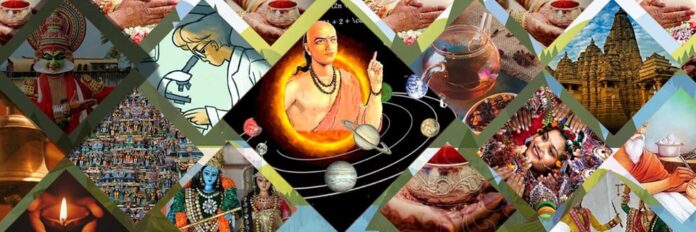Many still believe IKS is an amorphous concept, understood merely as a nostalgic invocation of a golden past with little bearing on the present. That reading is deeply flawed.
In recent years, Indian Knowledge Systems (IKS) have found their way into the mainstream of policymaking, NEP 2020 curriculum reform, and even public discourse. Yet, despite the visibility, we are nowhere close to treating IKS with the depth, seriousness, or institutional rigour it deserves. IKS is often reduced to a slogan, a sentimental celebration, or worse, a site of culture war. But if Bharat is serious about decolonizing its mind and shaping a knowledge order rooted in its own intellectual traditions, we need more than performative gestures. We need sharp questions and even sharper answers. Here we must confront and address to move from tokenism to transformation. It needs to include Sanskritic and other traditions, like Tamil, Buddhist, Tribal and Oral.
IS THERE REALLY A COHERENT FRAMEWORK FOR IKS?
Many still believe IKS is an amorphous concept, understood merely as a nostalgic invocation of a golden past with little bearing on the present. That reading is deeply flawed. It rests on three foundational concepts: Laukika Prayojana (practical application), Parampara (civilizational continuity), and Drsti (a distinct philosophical worldview). These are not ornamental phrases but guiding principles that shape how knowledge is produced, transmitted, and applied. However, it should be noted that these are starting points, and there is an urgent need to develop them further. IKS brings together Jnana (theoretical understanding), Vijnana (scientific knowledge), and Jivana Darsana (a philosophy of life). This triadic structure helps us bridge the ancient and the modern, offering an indigenous alternative to Eurocentric frameworks that often exclude lived experience, ethics, and metaphysics from legitimate inquiry. IKS is thus not frozen in time. But rather a living and evolving knowledge system that must be institutionally grounded and methodologically rigorous.
HOW IS IKS DIFFERENT FROM OR COMPLEMENTARY TO WESTERN SYSTEMS OF KNOWLEDGE?
Western epistemologies are often defined by their insistence on abstraction, quantification, and disciplinary silos. In contrast, IKS is integrative and interactive. Weaving together the empiricism and ethics; the observational and the intuitive; we would be able to grapple a harmonious understanding of dyadic concepts. Whether it is Nyaya (logic), Mimamsa (textual hermeneutics), or Ayurveda, the methodologies of IKS rest on careful reasoning, debate, and observation, anticipating and grounding them in the principles of the scientific method. Importantly, IKS does not view “nature” as an object to be conquered or exploited. It places humans within an ecological and cosmic order. It insists that knowledge must be socially embedded and morally anchored, making IKS a powerful complement to modern science, especially in our era of environmental collapse, ethical disorientation, and post-truth politics.
WHAT ARE THE CORE CHALLENGES IN MAINSTREAMING IKS?
The biggest hurdle is not opposition but ignorance, followed by tokenism. Despite institutional efforts postNEP 2020, most IKS initiatives remain underfunded, poorly conceptualized, or treated as peripheral electives. The colonial hangover lingers, creating a hierarchy where Western frameworks are seen as universal and Indian ones as parochial. There’s also the problem of elitist curation. The focus has yet to reach the oral, tribal, and vernacular knowledge systems that have sustained this country for centuries. Moreover, there’s a severe shortage of trained teachers, robust curricula, and interdisciplinary platforms that can integrate IKS with STEM and social sciences in a credible way. Without serious curriculum reform, public and, more importantly, private investment, and scholarly rigour, IKS will remain a decorative footnote rather than a foundational shift.
CAN ORAL TRADITION BE SYSTEMATIZED INTO MODERN EDUCATION?
Absolutely. India’s oral traditions are not primitive remains. They are heritages of memory with stunning sophistication. Vedic recitation systems, emphasizing pitch, rhythm, and redundancy, ensured error-free transmission over centuries. These oral pedagogies, frequently found in storytelling, craft traditions, and religious rituals, are rich repositories of ecological, ethical, and sociocultural knowledge that we must build upon.
This goes to more scientific needs like water conservation techniques that we can learn and build from various tribes that have mastered such techniques over centuries. With the help of digital tools, AI, and community collaboration, these traditions can be documented, preserved, and taught. But this requires a major epistemological shift: we must stop equating knowledge with text and literacy with intelligence. Reintegrating oral traditions into education also offers a powerful route to inclusion, hence restoring dignity to the knowledge held by tribals, women, and communities long excluded from elite institutions.
IS IKS ONLY ABOUT THE PAST, OR CAN IT SHAPE THE FUTURE?
IKS is a forward strategy, not some romanticized gazing of the past. Vrksayurveda (plant science) and traditional water harvesting systems like johad, tankas, and kunds offer sustainable solutions to the climate crisis. The logic of Ayurveda emphasizes preventive care and body-mind-environment balance, which are now being embraced globally in the wellness and public health sectors. Panini’s grammar, with its precise rule-based architecture, is already used in AI and NLP (Natural Language Processing) projects. Traditional architectural practices, such as vastu and vernacular materials, can inform climate-resilient urban planning. The future of innovation lies not in discarding the past but in mining it intelligently. IKS gives us a civilizational head-start only if we are bold enough to act upon it.
WHOSE KNOWLEDGE COUNTS IN THE REVIVAL OF IKS?
This is a critical question. A mistake we must avoid in developing IKS is to limit our efforts to the Sanskritic and male-dominated textual traditions. Instead, we must go beyond them to develop the IKS that is by all and for all. Be it STEM or humanities, be it North or South, be it male or female, be it mainstream or marginalized, be it global or tribal, be it past or future. India’s knowledge economy was always plural. Women like Gargi, Maitreyi, Rani Mangammal, and Savitribai Phule were no exceptions; they were intellectual and politically active actors in their own right.
Tribal communities, pastoralists, midwives, and artisans are custodians of healing systems, agricultural practices, and environmental wisdom. Reviving IKS without them is not only incomplete but rather an incomplete effort. Feminist and subaltern lenses are vital if we are to democratize knowledge. Honoring the shastra (text) is essential. But so is honouring the samskara (practice), the katha (narrative), and the jivana (lived experience).
HOW SHOULD IKS BE INTEGRATED INTO EDUCATION WITHOUT DILUTION OR TOKENISM?
The NEP 2020 offers an entry point, but implementation must match ambition. IKS should not be restricted to cultural appreciation courses or added as some sort of flavour in curricula. It must be treated as a knowledge system with its own methodologies, applications, and insights, which holds relevance for engineering, physics, philosophy, ethics, and governance. This means serious curriculum design, investment in IKS research centres, credit-bearing courses, and faculty who can engage traditional texts and modern applications. Collaboration with IITs, IIMs, and international institutions is key. IKS needs to enter the mainstream to contribute to Bharat’s intellectual renaissance. It should not be boxed in. It is not just the social sciences and humanities that can integrate the IKS. STEMs should also recognize the importance and value of the IKS if they wish to make a space for themselves beyond what Western scholarship has created for them. It is no longer a question of “to do” or “not to do” but “how to do” and “how best to do”.
HOW CAN WE MAKE THE IKS MOVEMENT SUSTAINABLE?
Government policy is a start, but sustainability depends on multi-sectoral investment. The public sector cannot sustain such ambitious efforts alone. The private sector, especially CSR programs, ed-tech platforms, and cultural industries, must fund fellowships, digitization projects, and innovation labs rooted in IKS. Community engagement is crucial: documentation and dissemination should be multilingual and inclusive.
Journals, repositories, MOOCs, and exchange programs must help globalize IKS scholarship. Most importantly, we must nurture a generation of scholars and citizens who see IKS not as a reverential inheritance but as a resource for innovation, ethics, and equity in the 21st century. We must view it as an intellectual opportunity, a renaissance, to reclaim our traditions and successes and that would be the real decolonial act that has been long overdue.
Prof. Santishree Dhulipudi Pandit is the Vice Chancellor of JNU.







